Free VPNs vs Paid VPNs — Which to Choose in 2025 and Why?
Why should you pay for a premium VPN when there are so many free options? There are actually many downsides to using a free VPN, while getting a paid VPN provides various advantages that make it worth the cost.
In this article, I’ll highlight the key differences between free and paid VPNs to help you decide which option is better. I’ll cover how well they perform at streaming, which option is more secure, which provides faster connection speeds, and more to ensure you can make an informed decision. Editor’s Note: We value our relationship with our readers, and we strive to earn your trust through transparency and integrity. We are in the same ownership group as some of the industry-leading products reviewed on this site: ExpressVPN, Cyberghost, Private Internet Access, and Intego. However, this does not affect our review process, as we adhere to a strict testing methodology.
Quick Summary: Free VPNs vs Paid VPNs
The following table demonstrates the main differences you’ll experience when using free VPNs compared to paid VPNs:
| Free | Paid | |
| Security and Privacy | Have weaker encryption standards and don’t have no-logs policies, meaning your activity won’t be private | Enforce strict no-logs policies and safeguard online activity using impenetrable industry-leading encryption standards |
| Servers | Limited server variety, leading to frequent overcrowding | Many server options, ensuring you can always find an uncrowded server |
| Streaming | Rarely work with any popular streaming platforms | Reliably maintain lag-free streams on major streaming platforms like Netflix, Max, and more |
| Connection Speeds | Significantly slower connection speeds than baseline values | Connection speeds are nearly as fast as baseline values |
| Customer Support | Slow customer support that’s often limited to email or online knowledge bases | Highly responsive support via 24/7 live chat and multiple other channels |
Free VPNs vs Paid VPNs: Complete Breakdown of Differences
Security and Privacy
Securing online activity and staying anonymous are key reasons people use VPNs, but you should note that it isn’t always possible with a free VPN. Although some ‘freemium’ versions of free apps maintain the same levels of protection as their paid counterparts, most free VPNs don’t prioritize your security.
Free VPNs either use weak encryption or don’t encrypt your traffic, exposing your activity to anyone trying to spy on what you’re doing. Additionally, most free VPNs don’t have no-logs policies, meaning they will likely log what you’re doing online, thus compromising your privacy.
In contrast, the top paid VPNs always provide impenetrable security. They use industry-leading encryption standards, like AES 256-bit, to safeguard your traffic and ensure no one can see your online activity. Plus, all worthwhile paid VPNs enforce strict no-logs policies, meaning your activity never gets logged.
Some of the top VPNs even go a step further. For instance, I found during tests that ExpressVPN’s TrustedServer technology makes it impossible for the service to keep logs of your activity. The servers are RAM-based and are rebooted regularly, meaning they’re incapable of storing any data for long.
Server Variety
Server variety is among the biggest compromises of a free VPN. Free apps usually provide very limited server networks. For instance, Proton VPN’s free plan provides you with the same security features as its paid plan. However, it only lets you connect to limited servers in the US, Netherlands, Japan, Romania, and Poland. You also can’t choose a location manually and must always rely on the Quick Connection feature.
The small server variety means a free VPN’s servers are often overcrowded, causing issues while connecting and significantly reducing connection speeds. Also, the limited options make it hard to find a nearby location, meaning your connection may be even slower if you’re connecting from a faraway location.
In contrast, premium VPNs always provide massive server networks. For instance, Private Internet Access (PIA) has a network of 35,000+ servers in 91 countries. It’s also one of the cheapest VPNs available, making this a great value. This enormous server variety ensures you never experience crowding and always get a fast and stable nearby connection.
Streaming Capability
Streaming capability is vastly different between free and paid VPNs. Most free VPNs don’t work with popular streaming platforms like Netflix, BBC iPlayer, Amazon Prime Video, and others. This is likely because streaming platforms quickly detect and block the limited servers they provide.
Streaming isn’t even guaranteed when using ‘freemium’ versions of paid VPNs. For example, while Proton VPN guarantees that paid subscriptions will work with Netflix US and other major streaming platforms, there’s no guarantee that the free servers will.
On the other hand, the top paid VPNs reliably work with a majority of streaming platforms. Apps like CyberGhost even have specialized servers that are optimized to ensure lag-free streams on Netflix, BBC iPlayer, and other streaming websites. You can easily find them in the VPN app with a few taps or clicks.
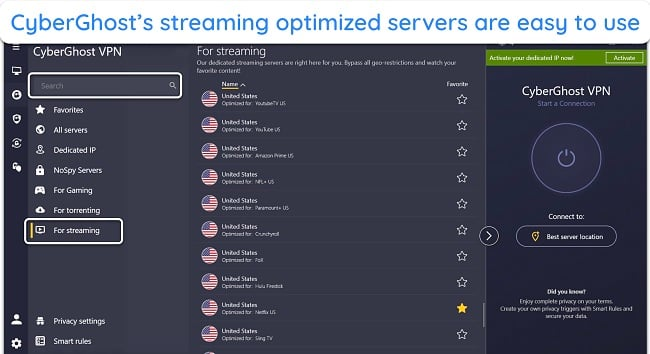
Connection Speeds
Connection speeds vary significantly when comparing free and paid VPNs. With top premium VPNs like ExpressVPN, you’ll get speeds close to baseline values. During tests, I connected to ExpressVPN servers in multiple countries, including the US, UK, Germany, and Australia. The average speed drop was only 15% compared to my baseline connection speed.
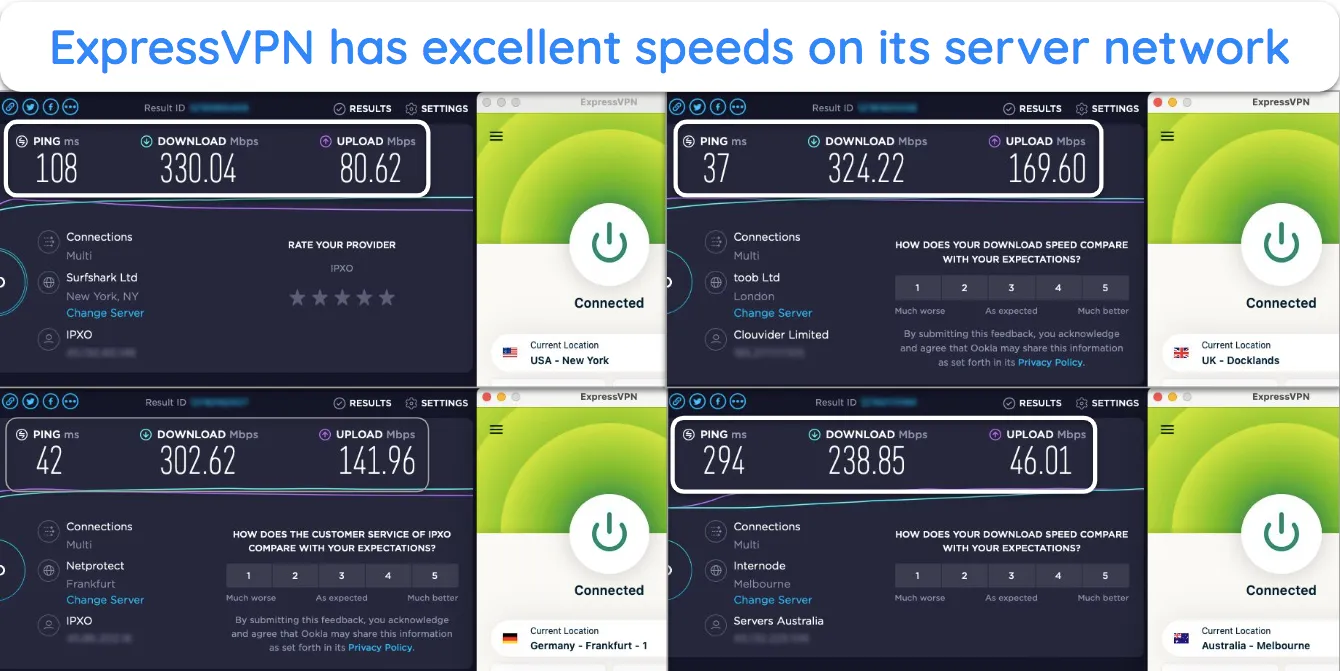
Other premium VPNs perform similarly well, meaning you can expect lag-free streaming, fast downloads, and smooth web browsing while using any of the top VPNs.
Unfortunately, speeds are much slower on a free VPN due to various reasons. Among the key reasons is that VPN providers often intentionally limit speeds on their free servers to entice people into buying the premium version of their VPN.
Crowding is another reason why free VPNs are usually much slower than paid ones. Since so many people connect to the same server, it becomes really congested, leading to a much slower connection.
With this in mind, it’s best to consider a premium VPN for playing games like Call of Duty: Warzone, watching shows online, making video calls, and doing anything else that requires a fast and stable connection.
Customer Support
Having responsive customer support for a VPN is critical, as you may have questions or run into issues while using the apps. Unfortunately, most free VPNs offer poor support. You can contact support via slow email support, and sometimes, you are limited to using the knowledge base to figure out a solution to your problem.
‘Freemium’ options like hide.me’s free plan include live chat support, making them good choices if having responsive support is a priority for you and you want a free VPN.
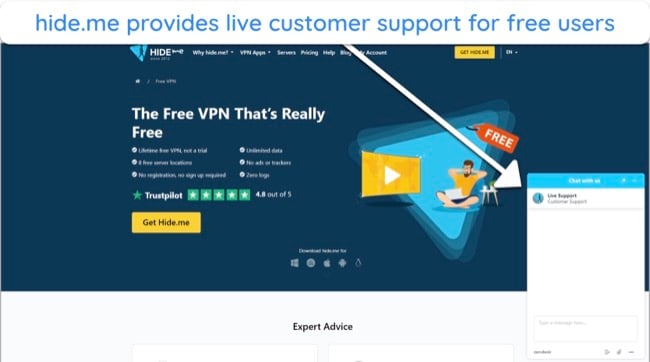
Thankfully, every top premium VPN comes with multiple responsive support channels. These include 24/7 live chat, faster email support, and highly detailed knowledge bases. This variety of support options ensures you quickly get help whenever needed. While testing CyberGhosts live chat support, I got a helpful answer to my question within minutes.
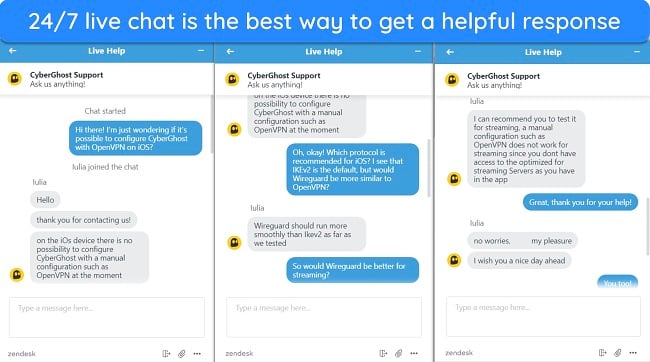
How Does a Free VPN Make Money?
Free VPN services sound attractive because they offer basic privacy and security at no cost. However, many free VPN providers profit from their users by selling data, serving targeting ads, or upselling them into premium upgrades. While these methods help sustain the service, some might compromise user privacy and security.
Selling Data
One of the biggest risks of using a free VPN is that it may sell your data. Since most free VPNs don’t have no-logs policies, they’re free to store your data and activity. They later sell this data to data brokering companies, exposing your online activity, habits, and various other personal details.
Ads
Free VPNs often bombard users with ads. Even if the VPN is safe and has servers where you need them, they may constantly disrupt the experience by requiring you to watch an ad. Some don’t even let you connect until you’ve watched a bunch of ads to increase your bandwidth allowance.
Upselling
Most free VPNs constantly attempt to upsell their users. You’ll get a pop-up asking you to subscribe whenever you connect, change a server, or adjust the settings. This quickly becomes annoying, as you often have to close many upsell pop-ups before you can even connect to the VPN.
What VPN Should You Choose?
All things considered, picking a paid VPN is the best overall choice. Choosing a premium option ensures you get unbreakable security, superfast connection speeds, and a massive server network. Plus, the best premium VPNs include useful extra features like obfuscation and multi-hop to add more layers of protection to your online activity.
However, if you’re set on using a free option, choose a reliable ‘freemium’ VPN, which offers the same protection as its paid counterpart. Of course, some features will be restricted on the free plan, but ‘freemium’ VPNs are much better than the strictly free apps, as they deliver better performance and won’t sell your data to third parties.
FAQs on Free vs Paid VPNs
Are free VPNs safe?
Is there a good free VPN?
Is it worth paying for a VPN?
What is the best overall VPN?
Free vs Paid VPNs: Know the Differences and Make the Right Choice
In conclusion, getting a paid VPN is always the better choice. For a reasonable price, you’ll get airtight security, much faster connection speeds, more servers to choose from, and responsive support that’s available whenever you need help.
If a paid subscription is an option, consider a ‘freemium’ VPN offered by paid VPN providers. They may restrict some in-app features and have slower speeds, but they ensure your online security is equally good as it would be with a paid VPN.



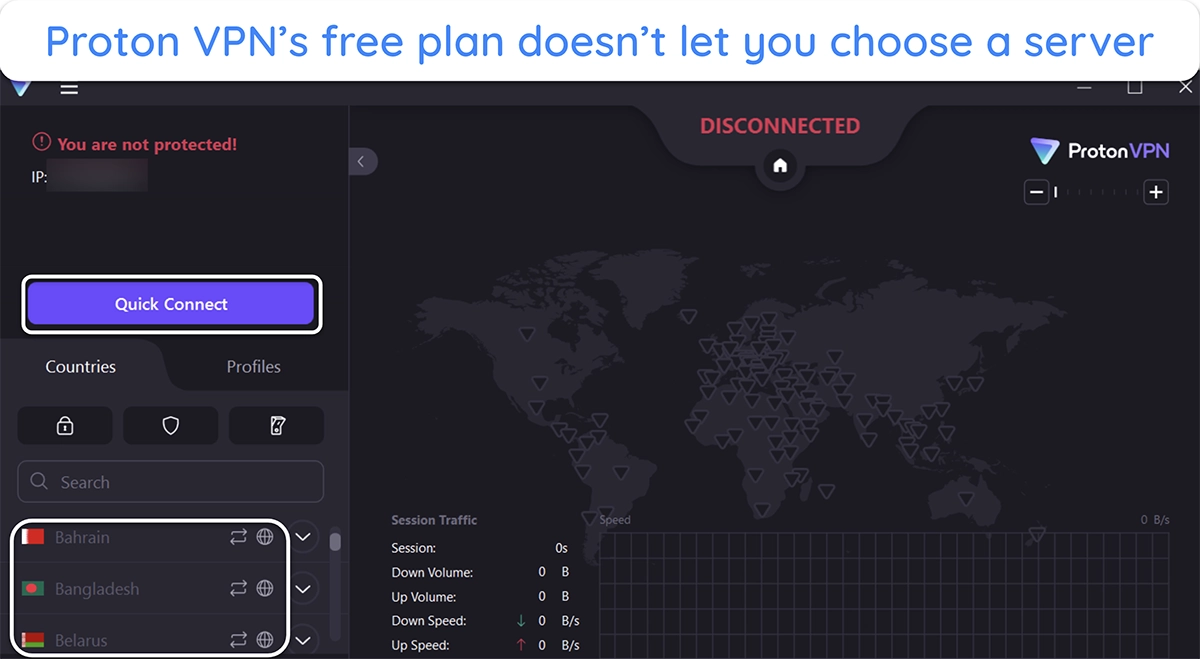




Leave a Comment
Cancel